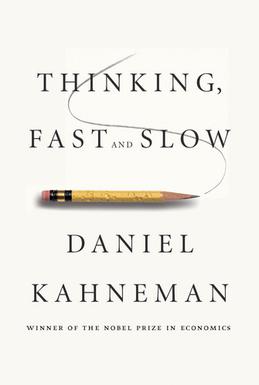The course actually covered some fairly familiar concepts regarding intuitive thinking versus rational thinking, how responses are affected by whether a situation is framed positively or negatively, how those responses can be primed by unrelated factors in our environment, etc. And the material referenced the work of scientists with which I'm actually conversant, like Antonio Damasio and Steven Pinker.
And then: Nobel laureate Daniel Kahneman. And I realized I have a book of his lying around somewhere unread that I received for Christmas a few years ago. Well, Thinking, Fast and Slow: no longer unread.
Kahneman summarizes the book in his conclusion:
I began this book by introducing two fictitious characters, spent some time discussing two species, and ended with two selves. The two characters were the intuitive System 1, which does the fast thinking, and the effortful and slower System 2, which does the slow thinking, monitors System 1, and maintains control as best it can within its limited resources. The two species were the fictitious Econs, who live in the land of theory, and the Humans, who act in the real world. The two selves are the experiencing self, which does the living, and the remembering self, which keeps score and make the choices. In this final chapter I consider some applications of the three distinctions.
I read the whole book word for word, cover to cover (is that how people read nonfiction?). The writing's a bit tedious at times; basically it's a retrospective of Kahneman's career, touching on all his research and the discoveries he made along the way. Anyone with an interest in cognitive processes will find examples and case studies to entertain or to puzzle over, some resonating more than others.
What Kahneman saves for the conclusion, though, caused a lightbulb moment. Individuals make intuitive but irrational decisions, and contradictory judgments, and "objective" assessments imbued with external influences — and these issues hold at the societal level of decision making as well. Kahneman makes a soft appeal for libertarian paternalism, where, given the known workings and weaknesses of systems of reasoning, policymakers should judiciously guide individuals using the principles of behavioral science (with experts to advise the policymakers, of course). Examples of applications of these principles include opt-out enrolment in social plans (like health care) and regulations regarding the labeling on food packaging and the framing of disclosures regarding fuel consumption. So, not just brain theory stuff.
Reviews and Insight
Two Brains Running — Jim Holt in the New York Times
And frowning — as one learns on Page 152 of this book — activates the skeptic within us: what Kahneman calls "System 2." Just putting on a frown, experiments show, works to reduce overconfidence; it causes us to be more analytical, more vigilant in our thinking; to question stories that we would otherwise unreflectively accept as true because they are facile and coherent. And that is why I frowningly gave this extraordinarily interesting book the most skeptical reading I could.
How to Dispel Your Illusions — Freeman Dyson in the New York Review of Books
There are huge differences between Freud and Kahneman, as one would expect for thinkers separated by a century. The deepest difference is that Freud is literary while Kahneman is scientific. The great contribution of Kahneman was to make psychology an experimental science, with experimental results that could be repeated and verified. Freud, in my view, made psychology a branch of literature, with stories and myths that appeal to the heart rather than to the mind. The central dogma of Freudian psychology was the Oedipus complex, a story borrowed from Greek mythology and enacted in the tragedies of Sophocles. Freud claimed that he had identified from his clinical practice the emotions children feel toward their parents that he called the Oedipus complex. His critics have rejected that claim. So Freud became to his admirers a prophet of spiritual and psychological wisdom, and to his detractors a quack doctor pretending to cure imaginary diseases. Kahneman took psychology in a diametrically opposite direction, not pretending to cure ailments but only trying to dispel illusions.
The King of Human Error — Michael Lewis in Vanity Fair
There's a quality both impish and joyous to Kahneman's work, and it is most on display in his collaboration with Amos Tversky. They had a rule of thumb, he explains: they would study no specific example of human idiocy or irrationality unless they first detected it in themselves. "People thought we were studying stupidity," says Kahneman. "But we were not. We were studying ourselves." Kahneman has a phrase to describe what they did: "Ironic research."



1 comment:
How about Predictably Irrational by Dan Ariely? An easier read than some...entertaining.
Post a Comment